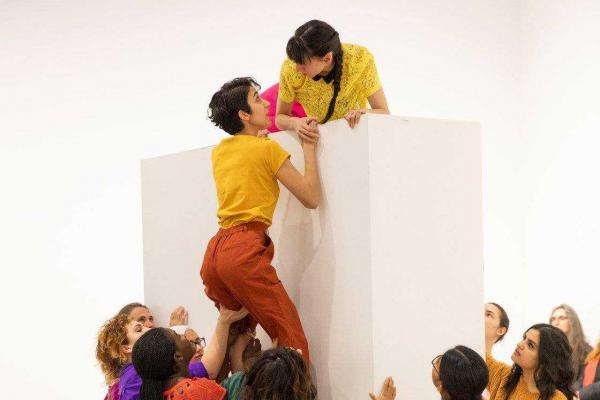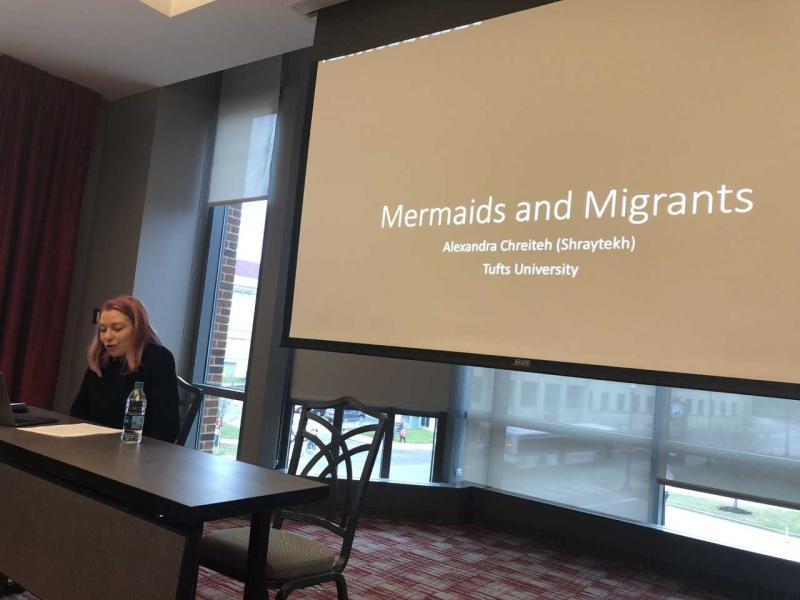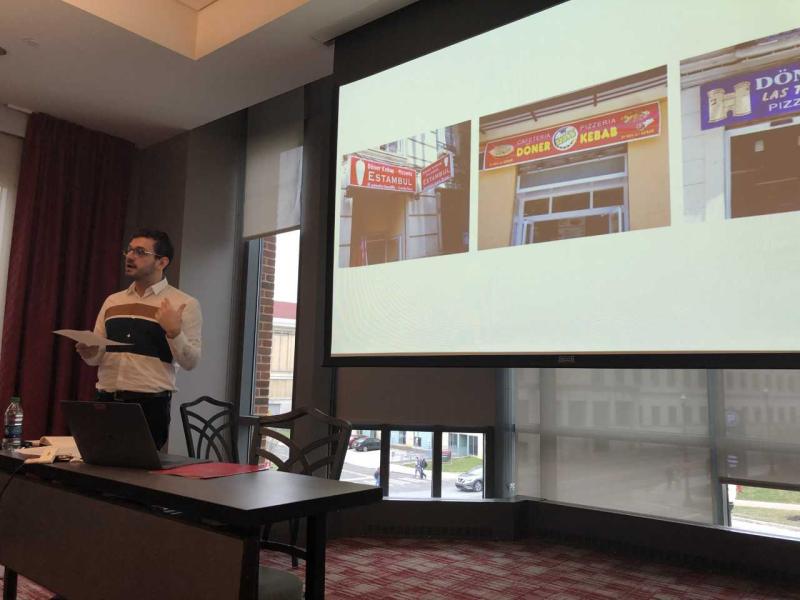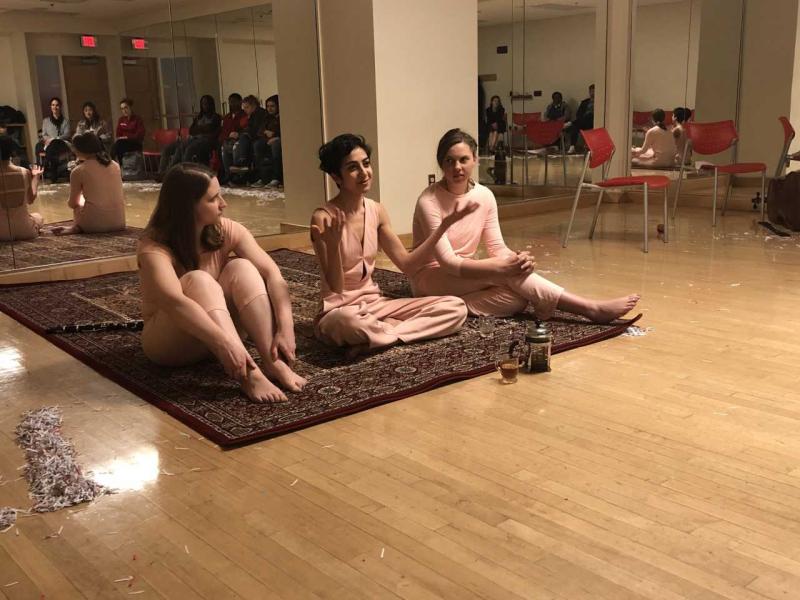Borders in Motion Symposium (March 28-29, 2019)

The idea behind the symposium was to think together about the work and meanings that borders perform in the world and to combine scholarly reflections on mobility with artistic performance, especially embodied practices. Geographically, our conversations and performances reflected on concepts of borders in spaces as wide-ranging as the Mediterranean, Palestine, Saudi Arabia, Iran, and the United States. Our presenters and performers came from fields such as Dance, comparative literature, food studies, African Studies, and graphic art.
In the two days of the symposium, we experienced and learned about a range of methods and approaches for thinking about and re-imagining the meanings of borders. Perhaps the best part was having space to reflect on these in dialogue with each other.
The first event of the symposium was an artist talk by Palestinian American artist and writer Leila Abdelrazaq. In this talk, which was held at the Billy Ireland Cartoon Library and Museum, Leila Abdelrazaq shared images from her career as an artist and writer. In her talk, she reflected on how her thinking about borders, nationalism, and national identity have shifted over time. From seeking to educate an American public about Palestinian diaspora, displacement, history, and memory through well-established tropes and images (like the tatreez embroidery or the symbols of oranges and olives that we see in her debut graphic novel Baddawi) she has reinvented her own visual vocabulary through her current work (such as this animation)
On Thursday evening, at the Beeler Gallery at CCAD, On Board(hers) presented their last performance of the season. On Board(hers) is a contemporary dance project based on the experiences of female immigrants. This last performance featured two walls that offered different possible iterations: writing on it, separating audience and performers, isolating the crowd, etc. Playing with these movable walls challenged the very idea of a border as well as the performers’ and audience’s physical and emotional relationship to it. This open rehearsal included the reciting of poetry, the performance of choreography inspired by the group’s writing, interaction with the audience, song, and more. It was followed by a lively and supportive Q&A and discussion between the On Board(hers) group and the audience.
On Friday, we had a full day of talks, screenings, and performances. MMI Artist in residence Alexandra Chreiteh opened the symposium in the morning by screening the short film Eye and Mermaid by Saudi director Shahad Amin. In this magical realist film, a young girl discovers that her father and other fishermen are capturing mermaids in the ocean, violently extracting black pearls from their tails, and abandoning the human half of their bodies. The girl manages to save a mermaid whose tail has been severed. When we meet the young girl as a grown woman, her surroundings drastically transformed by wealth, she returns to the ocean to face the mermaid and return the pearls.

The screening was followed by a fascinating presentation by Chreiteh on the film and on the mythology of mermaids in the Near Eas and elsewheret. Her close reading of the film included a rich gender analysis and discussion of mobility and borders. The audience response to the film was great! The film evoked so many questions and participants shared their own questions and insights. Many students in the audience had already read Chreiteh’s novel Ali and His Russian Mother and were also eager to connect the themes of the novel with the presentation of the film.
After a short coffee break, we reconvened for two talks. Badou Fall, who is a PhD candidate in the Department of French and Italian presented a talk titled “Deconstructing Borders: Migritude and Linguistic Barriers in African Studies.” In this talk, Fall discussed the consequences of conceiving of the discipline of African studies through linguistic borders (Francophone, Anglophone). Fall argued that this bordered conception of African studies contributes to the persistence of coloniality as this linguistic division is the product of the colonial matrix of power. Furthermore, this linguistic separation fails to demonstrate the linguistic and cultural richness of Africa and undermine the development of non-Europhone literature in African Literature.
Harry Kashdan, the Global Mediterranean GAHDT (Global Arts + Humanities Discovery Theme) Postdoc at OSU, presented a talk titled “Borders on the Table: Culinary Exchange and Commensality in the Mediterranean,” which traversed a variety of shifting borders on the Mediterranean table. Using examples from contemporary film and literature, Harry Kashdan examined the foods Mediterranean subjects share with their neighbors, and explored under what circumstances such culinary exchanges are authorized or forbidden. Some borders seem to dissolve when eating together, while some grow only more impenetrable in the face of the other.

Following these two excellent talks, we continued our conversations over lunch.
Finally, OSU MFA student (Dance) Bita Bell presented her performance Dam Noosh with cellist and singer Aubrey Liston and clarinetist Sarah Jaegers. Describing her performance (she choreographed the dance and composed the music with the musicians who performed with her), Bell states: “Dam means to inhale and to be on the edge. Noosh means to taste and is a feminine noun. Combined together, Dam Noosh is a way of brewing Iranian herbal tea, constructing multi-layered linguistic meanings into one communal activity of drinking tea. In this solo performance, senses of smell, touch, taste, visual and audio are stimulated for a visceral experience of an autobiographical narrative that struggles to transcend boundaries of identity.” (Bell) https://vimeo.com/317597198

Many thanks to the following entities and departments for making the symposium possible: MMI, The Department of French and Italian, The Department of Near Eastern Languages and Cultures, The Billy Ireland Cartoon Library and Museum, Department of Women’s, Gender, and Sexuality Studies.
